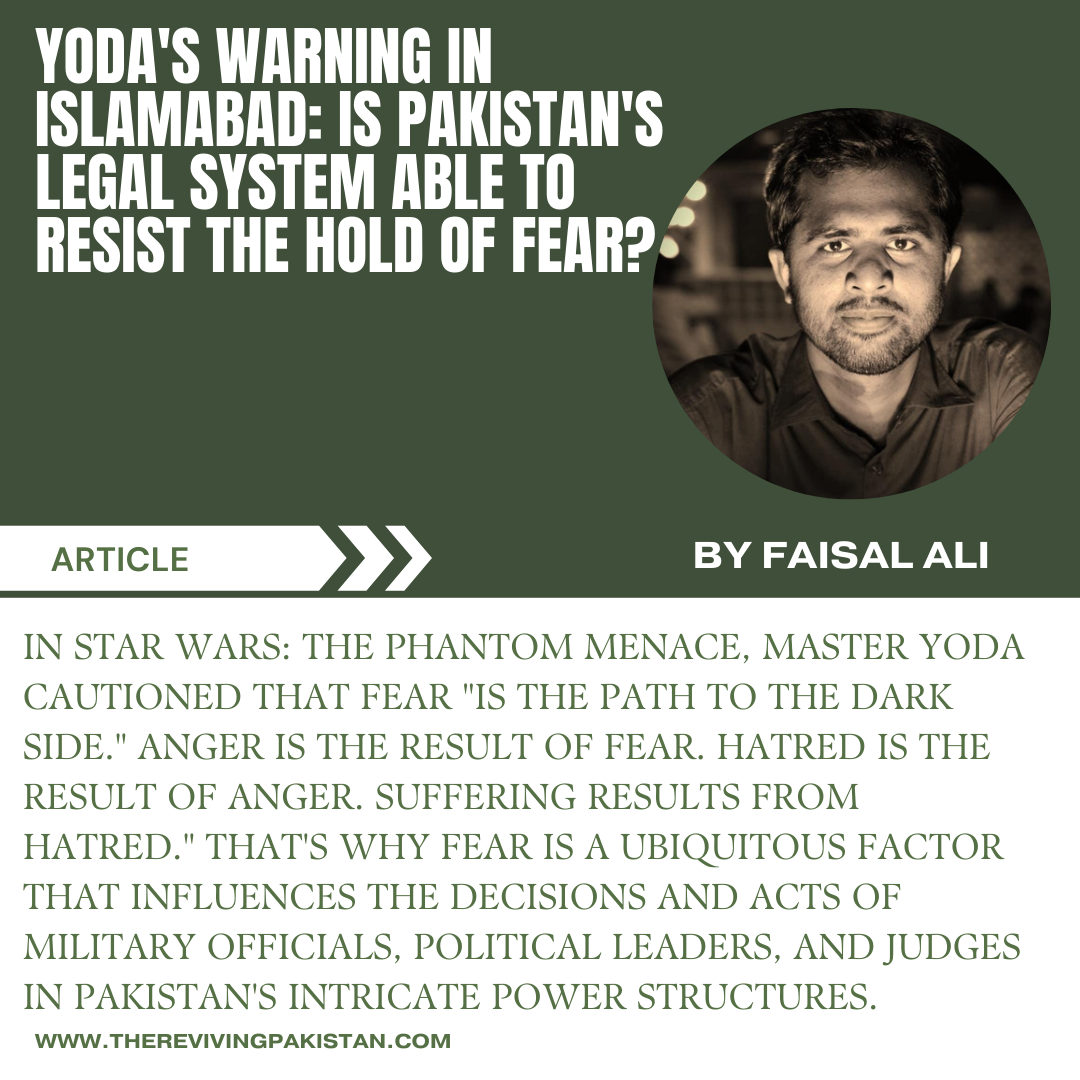About the Author(s)

Faisal Ali
The author is an independent researcher having keen interest in domestic affairs, foreign policy, geopolitics, and international relations.
In Star Wars: The Phantom Menace, Master Yoda cautioned that “fear is the path to the dark side. “Anger is the result of fear. Hatred is the result of anger. Suffering results from hatred.” That’s why fear is a ubiquitous factor that influences the decisions and acts of military officials, political leaders, and judges in Pakistan’s intricate power structures. This centuries-old Machiavellian idea has a lot of relevance in the modern Pakistani milieu. The relationship between fear and these institutions affects not just how they function but also how the nation’s legal system is governed.
Politicians in Pakistan use fear as a powerful tool to maintain control, stifle criticism, and cement their authority. The political history of Pakistan is replete with examples of the purposeful deployment of fear. For instance, there was a great deal of turmoil after former Prime Minister Imran Khan was arrested in 2023. His arrest, which was generally believed to have been planned by the military, exposed the country’s ingrained dread of military meddling in internal affairs and led to violent riots popularly known as May 9 riots. This illustrates how fear may be used to stifle criticism and uphold the status quo of authority. Another effective tool is the possibility of facing corruption charges. Politicians are always vulnerable to allegations that have the potential to ruin their careers. National Accountability Bureau’s role in this regard has been highly criticized by all the political parties and Supreme court’s judges too. For that, they remain obedient to the ruling class because they fear losing their careers. It cultivates a climate of self-preservation that erodes accountability and transparency, so undermining the rule of law.
Political and military pressure has made Pakistan’s judiciary fearful, putting their independence and morality in jeopardy. The Shehbaz Sharif government’s contentious talks over judicial reforms, interpreted as a political ploy, caused the judiciary to resist and impede Qazi’s demand for an extension.
Critics contend that the government’s attempts to curtail judicial independence and win favorable decisions undermine public trust because judges may decide to give preference to the powerful when deciding cases out of concern for the potential political fallout.
The military’s influence in Pakistani politics, as opposed to the judicial and executive branch, is arguably the most notable example of fear in action. In the past, the military has dominated politics and, out of a fear of losing its power, has frequently intervened through coups, direct control, and the installation of hybrid regimes known as PDM 1.0 and PDM 2.0. Since Quaid’s passing, civilian governments have been greatly influenced by the dread of military interference in their decisions and policies. The judiciary and other state institutions are also impacted by the military’s influence, which goes beyond politics. A threat of armed retaliation can discourage acts that could undermine its authority. This relationship became clear during the demonstrations that followed Imran Khan’s incarceration, as the military’s role in putting an end to the unrest and controlling it brought to light its widespread power. The military’s interests may take precedence over those of the country’s stability and democratic government as a result of this underlying anxiety.
A complicated and frequently turbulent atmosphere is produced by the interaction of fear among various institutions. The decisions and actions of important players are influenced by the fear of military intervention, judicial overreach, and political instability. An institution trying to use terror to hold onto power and influence can result from this dynamic in a vicious cycle of fear and repression. Fear of political instability, for example, can result in actions that compromise democratic processes, like delaying provincial elections even after violating Article 105(3) of the 1973 constitution, which says that “Where the Governor dissolves the Provincial Assembly… he shall: (a) appoint a date, not later than ninety days from the date of dissolution, for the holding of a general election to the Assembly.”, and the detention of opposition figures. Comparably, contentious changes meant to limit the independence of the court may arise from concerns about judicial overreach. Fear of military intervention can result in security-focused policies that subordinate democratic governance, so solidifying the military’s political influence. Because fear is interrelated, no one institution can function independently, which strengthens the control and fear loop.
A multidimensional approach is needed to address the persistent influence of fear in Pakistani politics, the courts, and the military. Significant challenges include rethinking the role of the military in governance, preserving judicial independence, and fortifying democratic institutions. Establishing accountability, transparency, and public involvement can foster trust and lessen the impact of fear.
It is imperative to reform the court in order to shield it from military and political meddling. This entails putting policies in place to guarantee judges’ independence and impartiality as well as protecting their tenure and decision-making procedures. In addition, political leaders should pledge to uphold democratic values and abstain from employing fear as a political tactic.
The rule of law is long shadowed in Pakistan by the widespread grip of fear. Concepts such as justice, equity, and responsibility suffer fatalities when judges, legislators, and military personnel operate in a perpetual state of fear. The rule of law, which is the cornerstone of any functional democracy, is undermined by repression and fear. With its imprisoned opposition, weakened judiciary, and powerful military, Pakistan’s current state of affairs reflects a system on the verge of a Hobbesian nightmare. Hobbes maintained that humans were born into a condition of perpetual terror, a “war of all against all” in which survival was the most important factor. The quest for security is reflected in Pakistan’s political environment, where fears of imprisonment or military action may take precedence over the rule of law and democracy. To shift Pakistan away from a fear-based government, it is essential to have a strong and independent judiciary and stick to democratic values, much as Hobbes saw reason driving people to construct a powerful sovereign to assure safety.


1 comment
Great work MashaAllah
Comments are closed.